Opinion
FootballHow Louis van Gaal's philosophy came good at Manchester United
/dnl.eurosport.com/sd/img/placeholder/eurosport_logo_1x1.png)
Published 07/05/2015 at 19:57 GMT
Greg Johnson of Squawka says we are now seeing the true manifestation of Louis van Gaal's philosophy at Manchester United - who are back where they belong.
Eurosport
Image credit: Eurosport
- - -
If you come at the English with a philosophy, you best not miss. After all, failure to make high-minded ideas count will always count against managers who dare to stick their heads above the pulpit and define themselves as thinkers in one form or another.
Andre Villas-Boas was far from blameless when it came to his two Premier League dismissals at Chelsea and Tottenham Hotspur, but his profile as a bookish, bright young analyst hardly helped to endear him to his new public. Similarly, Rafael Benitez’s exotic preferences for zonal marking and stringent squad rotation marked him out as a foreign oddity ripe for derision. Arsene Wenger and Brendan Rodgers both receive plenty of ridicule for their love of concepts and scholastic mannerisms when the results begin to dry up.
When motivators like Gus Poyet are sacked, sympathy rings out: ex-players never seem to know where “it all went wrong” for a “top bloke” and “good manager”. When more scholarly types fall onto hard times, it’s always a case of having fallen on their own sword. They brought it upon themselves by trying to be clever, of course.
Fortunately for Manchester United, it appears that Louis van Gaal’s own rather theoretical formula for success has finally begun to deliver at Old Trafford, and not a moment too soon.
Beyond the usual first impressions, new managers (and players) often seem to be granted a small, limited window of opportunity during which the Premier League can get used to them and get to know them. Through their early, defining forays into the secondary world of press conferences, interviews and reaction shots from the dug-out they inevitably end up crafting their own caricatures in front of the cameras and microphones they find themselves faced with. Whether it’s Jose Mourinho proclaiming himself to be special, or the rather more stand-offish stylings of Villas-Boas and Benitez versus the press, they end up setting the reference points against which they will be measured and characterised.
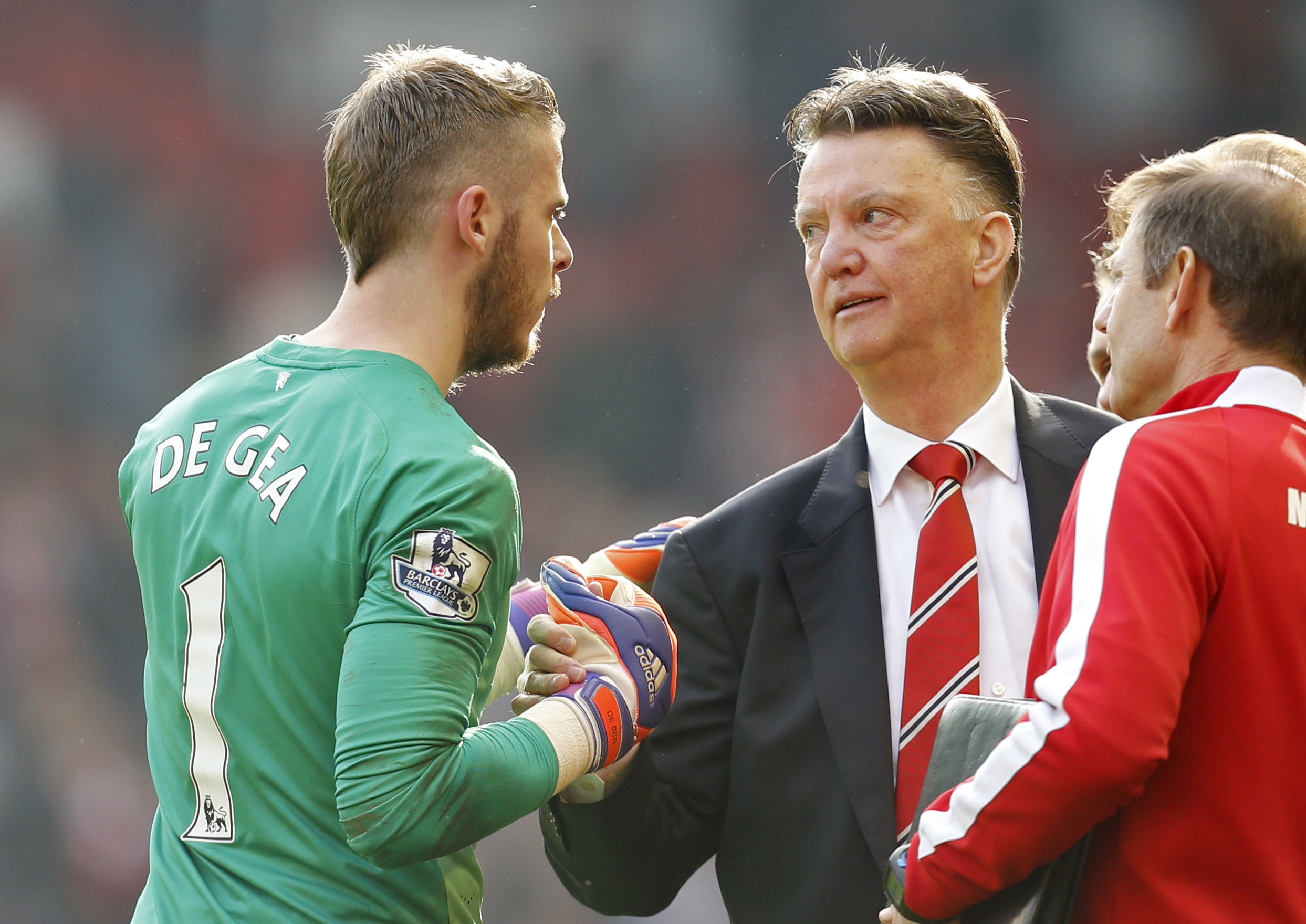
Van Gaal arrived in England with a proven track record at club level, and an unexpected third-place finish at the 2014 World Cup with Netherlands under his belt, which gifted him a certain amount of insulation against his initial doubters. Yet United’s failure to fully embody total football within a matter of weeks soon brought scrutiny over his age, achievements, relevance and resolve. He went from being a venerable genius to the Emperor with a wardrobe stuck in stealth mode.
All looked lost for a moment following the Dutchman’s act of unwitting self-sabotage amidst the fallout of Sam Allardyce’s “long ball” criticism of United’s tactics in early February. Out came the ill-considered graphs, print outs and cringing press officer as Van Gaal attempted to prove himself through facts. However, he had misjudged his audience: the football-focused subset of a spiteful, insular culture that absolutely relishes the sport of doing individuals down and putting them in their place.
By the time that United’s 3-0 win over Spurs rolled around, expectations had sunk. A 2-1 loss to Arsenal at home in the FA Cup appeared to have all but signalled that the chance for Van Gaal’s philosophy to come good in any meaningful way this season had passed. The pie charts he produced to counter Allardyce’s claims threatened to undermine and overshadow his CV full of previous accomplishments in a league that puts first-hand experience above all else when assessing ability, a tendency that also affects players. Regardless of their successes, questions marks remained over the heads of Lionel Messi and Zlatan Ibrahimovic for many in England until they “did it” against an English club. Who cared about Van Gaal’s trophies with Ajax, Barcelona, AZ Alkmaar and Bayern Munich when it was clear his “total football” couldn’t cut it on a dry, settled Thursday afternoon against Stoke City?

The home victory over Spurs, and the manner in which the first half was won and the second was controlled, appeared to change everything. Just when it looked as though Van Gaal’s moment had gotten away from him - potentially dooming his tenure at Old Trafford to become a perpetual punchline for innuendo and parallels with Benitez’s own “facts”-leaden press conference in 2009 - it all came together.
Yet that could have just been a fluke result. After all, as Sir Alex Ferguson himself would say, “lads, it’s Tottenham.” The proof that it was anything but came against Liverpool, away at Anfield, as United won 2-1 at the home of their fiercest rivals and arguably the form team of 2015 in the Premier League.
As Rob Smyth wrote back in February, Van Gaal’s mistake in that unfortunate press conference was that he mistook the English media as being mature enough, and intellectually ready, for a deeper discussion about the details of his “philosophy”. Perhaps similarly erroneous expectations were to blame for United’s unconvincing performances earlier in the season? Like those who attended his press conference, he assumed too much of the squad he was presented with in the summer, and they are only now getting to grips with the technical and tactical demands of the Dutchman’s system.
It took Bayern until the second half of his debut season in Germany to make good on his designs on the pitch. United have had to wait until the final quarter of their first campaign under Van Gaal to begin to realise the potential of his work in the shape of a much-anticipated 4-3-3 formation against Spurs and Liverpool.
Mauricio Pochettino’s men couldn’t cope against United’s left-side as Marouane Fellaini dominated Eric Dier in his own area, both physically and aerially. The young Englishman couldn’t cope with the Belgian’s awkward frame or the aggression of his runs into the left-hand channel of the box. Out wide, Kyle Walker and Andros Townsend never looked able to muster an adequate response to the pressure exerted by Daley Blind and Ashley Young upon their flank. It was a similar story against Liverpool, who lined up in their 3-4-3 (or 3-4-1-2) formation, with Raheem Sterling as a right wing-back ahead of Emre Can, the right-most centre-back in Rodgers’ back three. The German ended up looking even more exposed than Dier was, with Martin Skrtel required elsewhere to keep track of other dangers.
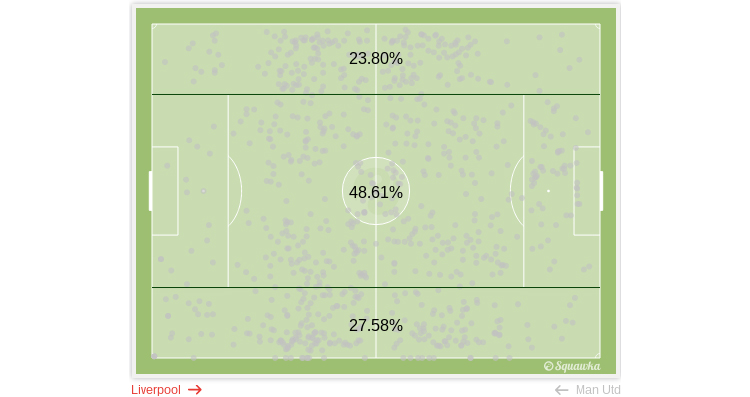
Jordan Henderson wasn’t able drop back and see off the Belgian as he had done in Liverpool’s win at Old Trafford last season due to Michael Carrick and Ander Herrera keeping him busy through the middle. They also proved too much for Nabil Bentaleb, Ryan Mason and Christian Eriksen in the win over Spurs and look set to be the foundation upon which any top-four finish will be built.
It was down the right flank that United were able to do the most damage against Liverpool however, with Juan Mata making the most of his cunning and skill to drift inside from the wing to score twice, within the first 15 minutes of either half. With Blind helping to provide width down the left, Antonio Valencia pushed up high on the right as his Spanish team-mate roamed towards the box.
Though still hardly the kind of explosive, overlapping full-backs that Old Trafford became used to watching under Ferguson, this freedom to run beyond the designated wide man is something of a departure for Van Gaal. He prefers his widest defenders to play the role of, what he calls, “killers”: players who focus first and foremost on pinning the opposition’s wingers and delivering sharp, swift balls forward to more creative players. This tweak could be considered an adaptation to fit the tastes of the crowds in Manchester, who will long after exciting, pneumatic wing play, but it’s not the Dutchman’s only compromise of late.
Marcos Rojo has been sidelined through injury, leading to Phil Jones and Chris Smalling taking up position as the team’s two centre-backs. Both are right-footed; a detail that falls outside of their manager’s ideal to have a balanced pairing of central defenders most capable on the foot that matches the flank closest to them. Having moved to play a back three at the start of the season - a switch made to provide an extra man for a defence that is weak in one-on-one encounters and lacking midfield cover (as was also the case with Netherlands at the World Cup) - the seemingly now permanent return of a back four should be seen as a show of faith in United’s two English defenders.
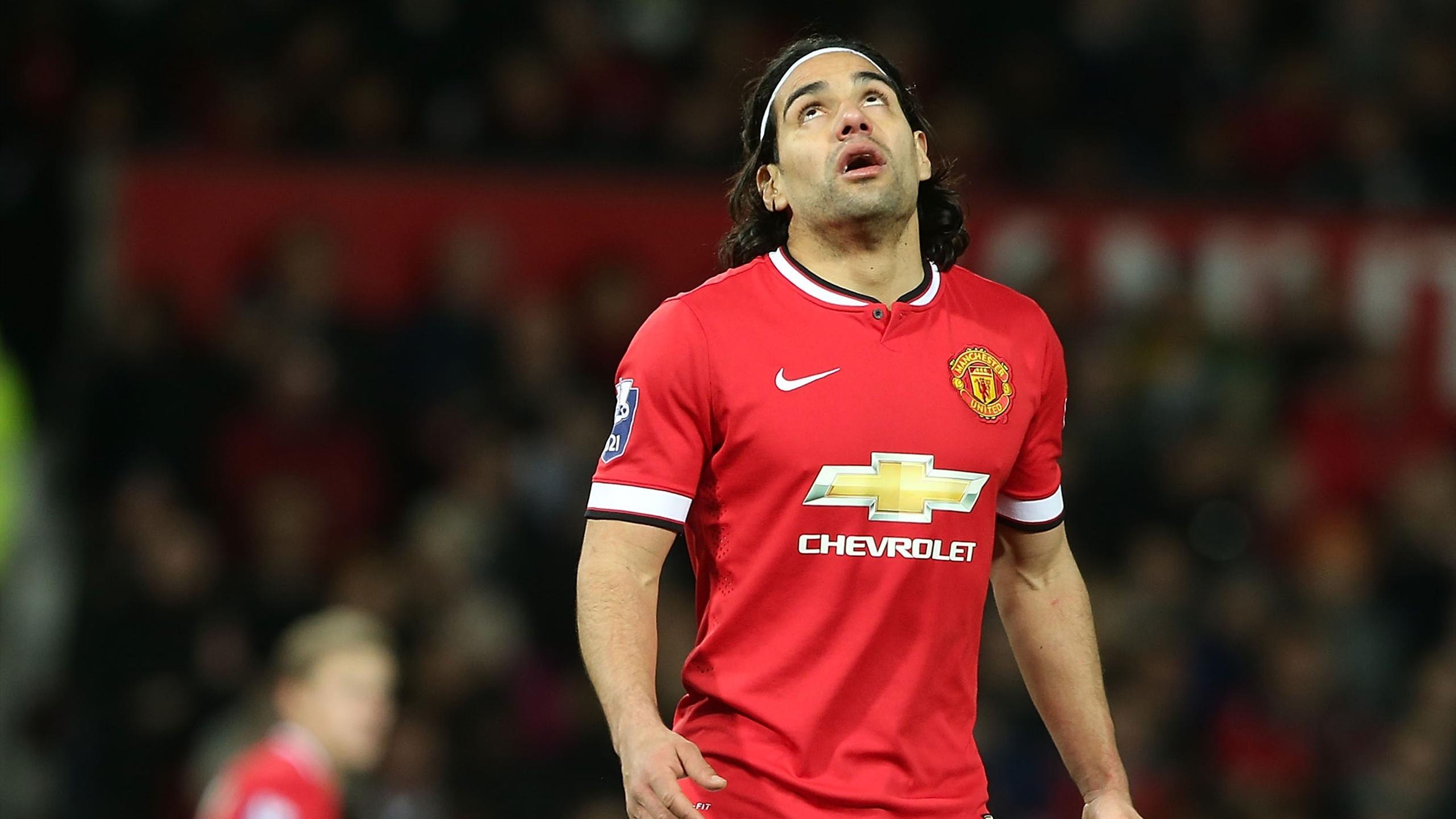
Radamel Falcao is still to show the kind of quality that saw him chalk up 155 goals in 200 games for Porto, Atletico Madrid and Monaco, and club record-signing Angel Di Maria is out of sorts following a burglary at his home, and out of favour. Yet the absence of these two headliners has hardly seemed to matter of late, with the team coming to the fore through the efforts of players such as Blind, Herrera and Carrick, and the unprecedented contributions of Young and Fellaini. Both Falcao and Di Maria will have to prove their worth to the system before they can take back the starting roles they may feel entitled to.
There remains something of a rub, however. Had Robin van Persie not been ruled out through his own injury problems, would he have remained as a first-choice starter, and if so would United have been able to click in the manner that they did in their last two league games? Given the old adage about class and form, some fans may still need convincing over the permanence of Van Gaal’s performance level and that of his team.
As a general rule, a manager’s win ratio over the course of their career is a relatively reliable baseline, with most eventually regressing to their overall mean. Van Gaal currently holds an all-time win percentage of 61.20% from 835 games as a club and international manager. His present win percentage at United is 55.56% from 36 games. Compare that with his record at Ajax (68.77% of his 285 games in charge ended in victory), first stint at Barcelona (55.56% from 171 games), AZ Alkmaar (57.95% from 176 games) and Bayern (61.46% from 96 games).
He is already matching the ratio he built up during his most successful stint in Spain. Due to the rumours that United will invest in another major refit this summer, optimists may well believe a further climb in standards will soon follow to match his other records at AZ, Bayern and maybe even Ajax, though that seems unlikely. Pessimists can argue that he has already reached his level at Old Trafford given the parallel percentage with his first term at Barcelona and the usually short-term nature of his stays at clubs outside of the Netherlands.
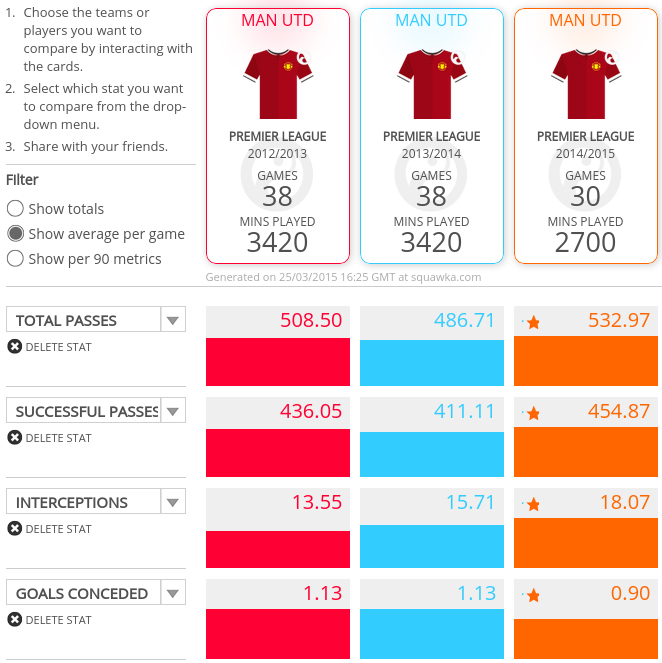
Yet in his first season he has already made a marked difference to the type of football played by his team. Possession has become prioritised like never before. The rigidity favoured by David Moyes has been replaced by an expectation that players will seek out and win one-on-one duels in order to create overloads and breaks across the pitch.
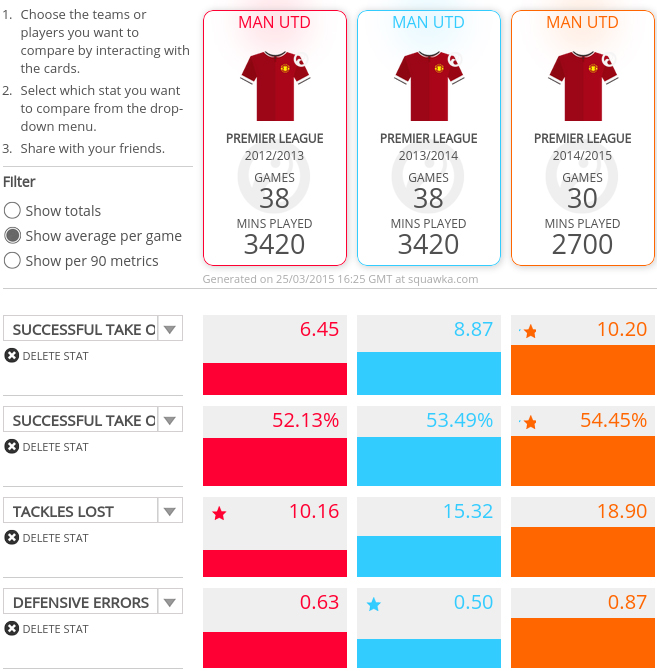
United are going in for more tackles and take-ons than in previous season, even if they’re not always winning too many of the former. The number of chances created and shots taken have fallen as individuals are cowed by the discipline of the system. However, a sense of character has returned to the team, especially in games against rivals and so-called “big teams”.
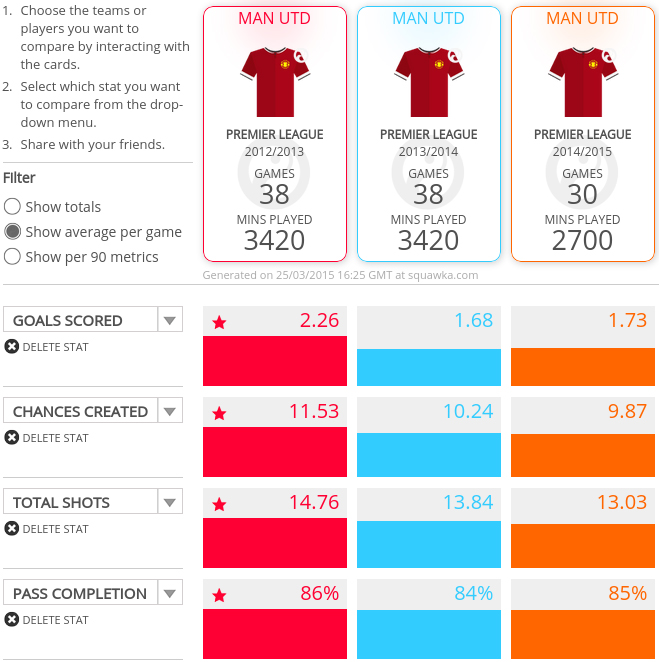
Van Gaal’s various idiosyncrasies mean that he will always be an entertaining source of surreal quotes and unintentional humour but with momentum back on his side he looks to have staved off the perpetual climate of mockery that could have enveloped him. The mystique of Ajax, Total Football and his past record may have been stripped away by a season of up-close-and-personal observations but the Premier League loves a winner, especially one with a bit of drama. Success is football’s very own escape velocity.
In years to come, should United capture the top-four spot they crave, pundits will look back to this season and ignore the teething problems over theory and philosophy and instead remember a strong finish. Van Gaal will be seen as the man who took United back to where they believe they belong.
Greg Johnson - @gregianjohnson
Scan me
Related Topics
Share this article
Advertisement
Advertisement